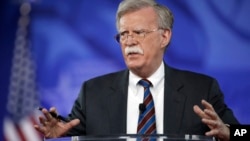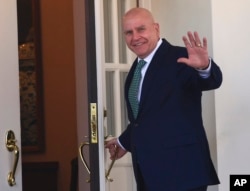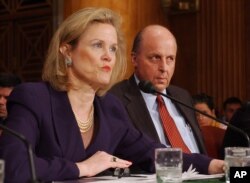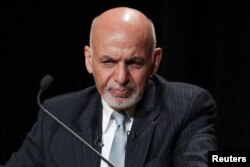President Donald Trump’s latest pick for national security adviser, John Bolton, says the United States cannot walk away from the war in Afghanistan because of the larger threat from the Taliban, the Islamic State terror group and al-Qaida.
Bolton, a former U.S. ambassador to the United Nations who is widely known for his hardline views, is set to become Trump’s new national security adviser, after his predecessor, H.R. McMaster resigned following reports of “irreparable” differences with the president and other key White House officials.
WATCH: Experts: Trump's Bolton Pick Signals Shift Toward More Aggressive US Foreign Policy
Bolton told an audience in Washington in late February that Americans are frustrated that the U.S. is still in Afghanistan.
“We didn’t start this war, we don’t want this war. But one side doesn’t get to say, 'OK, we’re tired of it, I think it’s over,’ ” he said while speaking at the Daniel Morgan Graduate School of National Security in Washington.
A case for U.S. involvement in Afghanistan
Bolton’s views on ensuring the Taliban are degraded square with Trump’s Afghan strategy announced last August. Trump committed to sustaining the U.S. military campaign for as long as necessary and empowered American field commanders in Afghanistan to make tactical decisions as they deemed necessary.
But the Trump administration has since faced criticism about the lack of a complementary political and diplomatic strategy to achieve reconciliation in a country replete with ethnic fault lines, government corruption and a resilient Taliban.
In an interview with VOA, former U.S. Ambassador Robin Raphel praised Bolton’s recognition that the U.S. cannot walk away from the Afghan war.
Buts she noted Bolton must also recognize “the need to energize the political track, as has been affirmed by [Defense] Secretary [Jim] Mattis and General [John] Nicholson, who recognize there’s no military solution to Afghan conflict.” Nicholson is commander of U.S. Forces Afghanistan and the Resolute Support Mission.
Radicals in Pakistan
Conceding that the Taliban insurgency is gaining momentum, Bolton has argued that a more compelling reason for the U.S. staying the course in the Afghan war is to prevent radicals in neighboring Pakistan from being emboldened.
During his talk last month, Bolton said radicals inside Pakistan “already controlled the military’s intelligence wing and are [an] increasing threat across the officer corps.” He went on to say that if Pakistan’s nuclear arsenal were to fall into the hands of the radicals, “you would have Iran on steroids right now.”
Pakistani officials have long rejected the notion that the country’s nuclear arsenal is at risk, even though the founder of the country’s nuclear weapons program, A.Q. Khan, once sold the technology to Iran and other countries.
The former U.N. ambassador cautioned that the risk of Pakistan selling or transferring nuclear devices to terrorist groups would be a danger not only to India but also to the rest of the world. This view is likely to stir the long-standing view held by a section of Pakistan’s security establishment that the U.S. wants a permanent foothold in Afghanistan to secure Pakistan’s nuclear weapons in case of emergency.
Bolton has called on Americans to be patient about the Afghan conflict, despite the war being “costly in terms of American lives.”
“There’s a lot of dissatisfaction with the Afghan performance over the years. We’re obviously in a difficulty in our relationship with Pakistan. It’s been a difficult relationship for a long time,” Bolton said in his speech at the Morgan school.
Taliban talks
Bolton is assuming the post of Trump’s national security adviser at a time when U.S. officials are attempting to persuade the Taliban to engage with the recent peace overtures by Afghan President Ashraf Ghani.
Ghani has pledged the Taliban’s reintegration in Afghanistan’s political and administrative structures, if they lay down the arms and willingly morph into a political party.
Deputy Assistant Secretary of State Alice Wells recently told VOA she believed the Taliban were taking time to weigh the Afghan president’s peace offer. Wells expressed hope the Taliban would indicate their willingness to engage in negotiations over what she described as Ghani's “forward-leaning approach” ahead of the Tashkent Peace Conference that opens Monday in Uzbekistan’s capital.
Delegates from the U.S., European Union, Turkey, China, India, Pakistan, Afghanistan and other regional partners will participate in a two-day huddle in support of Ghani’s peace initiative. According to the latest reports, Taliban leaders have not contacted Uzbek authorities or other parties signaling their willingness to participate in the Tashkent conference.



